Hurricane Season Preparedness: Are You Ready?
Hurricane season is upon us, and it’s important to be prepared for the potential storms that may come your way. Being proactive and taking the necessary steps can significantly reduce the impact a hurricane can have on your life and property. Here are some key areas to focus on.
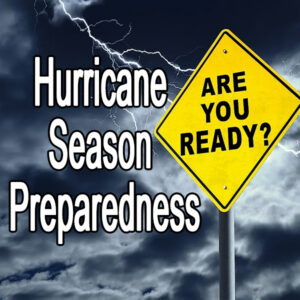
Emergency Kit Essentials
- Food and Water: Stock up on non-perishable food items and plenty of clean water for at least 3 days for each person and pet in your household. Remember if you are stocking up dehydrated or freeze-dried foods to have extra water to rehydrate them.
- First Aid Supplies: A well-stocked first aid kit is crucial for addressing minor injuries and emergencies. Be sure to always have an ample supply of any prescription medications you take daily.
- Flashlights, Batteries or Solar Lighting: Ensure you have reliable lighting sources in case of power outages. This can be standard battery-operated flashlights or lanterns, solar lights or camping lanterns and even glow sticks.
- Battery or Solar Powered Radio: Stay informed about weather updates and emergency announcements. Having a battery, solar or hand crank radio to use in case power goes out is important to keep up to date on the situation in your area.
- Important Documents: Keep copies of essential documents, such as insurance policies, birth certificates, and identification cards, in a safe place. A binder that can easily be put into a backpack in case you need to evacuate is helpful.
- Cash: Having cash on hand can be helpful in case ATMs or credit card systems are disrupted. In many emergency situations with hurricanes, floods, tornadoes, winter storms, etc. the power can be out for days and your only purchase option for food or gasoline is cash.
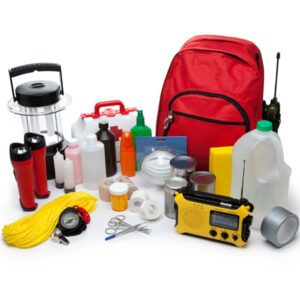
Home Security
- Secure Outdoor Objects: Bring in or tie down loose items, such as lawn furniture, garbage cans, and potted plants, to prevent them from becoming projectiles during strong winds. Make sure yard decorations are secure or bring them in; this includes things like wind chimes, hanging plants, etc.
- Protect Windows and Doors: Consider installing hurricane shutters or impact-resistant windows and doors. If these options aren’t available, use plywood or storm shutters to protect your windows. Consider keeping a few precut sheets of plywood already measured to the size you need for at risk windows or doors.
- Reinforce Garage Doors: Ensure your garage door is securely attached to the frame and consider installing a hurricane reinforcement kit and remember garage windows can also be at risk.
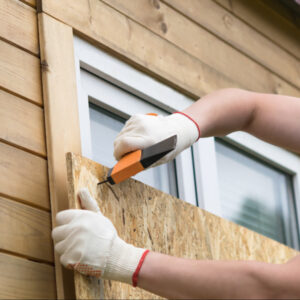
Stay Informed
- Monitor Weather Updates: Stay informed about weather forecasts and emergency alerts through local news, radio stations, and reliable online sources. The sooner you can prepare for an emergency, the better chance you have to minimize damage from its impact.
- Sign Up for Alerts: Register for emergency alerts from your local government to receive timely updates. Most smart phones have emergency weather alerts that can be set for your immediate area. Because hurricane preparedness activities become difficult once winds reach tropical storm force (sustained winds of 39 to 73 mph), the hurricane warning is issued 36 hours in advance of the anticipated onset of tropical-storm-force winds to allow for important preparation.
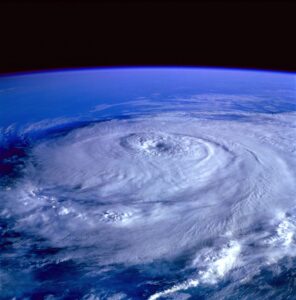
Evacuation Plan
- Identify Evacuation Routes: Determine multiple escape routes from your home in case of an emergency. Let other family members know your planned route.
- Know Your Zone: Familiarize yourself with your evacuation zone and follow local authorities’ instructions. If your evacuation route includes a bridge, low lying area near a stream, levee or river be prepared to use another route if the water has risen over the road. If your route goes through an an area prone to rock or mudslides, you should also have an alternate route.
- Prepare for Pets: If you have pets, make arrangements for their care during an evacuation. Know what emergency shelters in your area allow pets or have other arrangements to house them through the emergency. (Never plan to just leave your pets to fend for themselves)

Insurance Review
- Review Your Coverage: Ensure your homeowners’ insurance policy provides adequate coverage for hurricane-related damage. Consider purchasing flood insurance if you live in a flood-prone area. Don’t assume you’re covered especially if you recently changed providers or renewed your insurance.
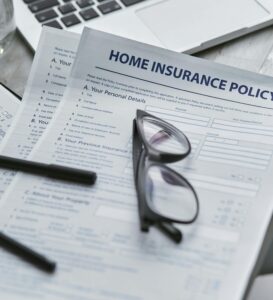
By taking these proactive steps, you can significantly increase your chances of weathering a hurricane safely and minimizing the impact on your life. Remember, being prepared is key to ensuring the well-being of yourself and your loved ones.
December 27, 2024 @ 7:25 am
I went over this web site and I believe you have a lot of great info, saved to bookmarks (:.